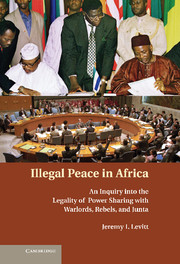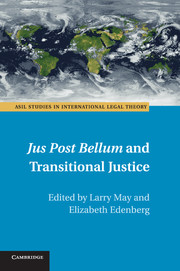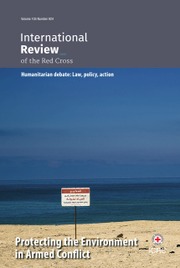Illegal Peace in Africa
African states have become testing grounds for Western conflict-resolution experiments, particularly power-sharing agreements, supposedly intended to end deadly conflict, secure peace and build democracy in divided societies. This volume examines the legal and political efficacy of transitional political power-sharing between democratically constituted governments and the African warlords, rebels, or junta that seek to violently unseat them. What role does law indicate for itself to play in informing, shaping and regulating peace agreements? This book addresses this question and others through the prism of three West African case studies: Liberia, Sierra Leone and Guinea-Bissau. It applies the neo-Kadeshean model of analysis and offers a framework for a 'Law on Power-sharing'. In a field dominated by political scientists, and drawing from ancient and contemporary international law, this book represents the first substantive legal critique of the law, practice and politics of power-sharing.
- Presents a multidisciplinary study drawing from law, political science and history
- Provides the first substantive inquiry into the legality of peace agreements, particularly political power-sharing
- Addresses this issue and others through the prism of three West African case studies: Liberia, Sierra Leone and Guinea-Bissau
Reviews & endorsements
"Professor Levitt's book fills a gap in the literature concerning the law of non-international armed conflict and post-conflict reconstruction. Levitt argues persuasively that preference be given to peace agreements that comport with the rule of law, rather than politically expedient and extralegal arrangements because the latter risk the creation of power-sharing structures that not only result in impunity for international crimes, but lead to continued domestic abuses. If international law is to apply satisfactorily in these situations, his argument needs to be heard."
- James Crawford
Whewell Professor of International Law at the University of Cambridge
This path-breaking inquest into the legal dimensions of power-sharing offers a wealth of original insights into modern techniques of conflict management and resolution in West Africa. In a fascinating plunge into the international law of antiquity in Africa, Professor Levitt provides a vital point of entry into the relevance of law in assessing the viability of power-sharing formulas. He convincingly argues that the rule of law and constitutionality are crucial elements in peace construction and conflict resolution."
- René Lamarchand
Professor Emeritus of Political Science at the University of Florida
"Professor Levitt presents a crisply written cri de coeur that refreshingly up-end traditional bromides and verities proclaimed by international lawyers who criticize amnesties for war criminals or political scientists who aspire only to 'free and fair' elections supervised by the UN. He provocatively argues that transitional power-sharing arrangements that empower and amnesty 'bandits of the law' fail precisely because they elevate short-term political concerns over respect for law."
- José E. Alvarez
Herbert and Rose Rubin Professor of Law at the New York University School of Law
"Professor Levitt has once again written a pioneering book that excavates millennia-old African legal norms and shows how they have bled into modern international law to create an emerging jurisprudence of peace. It illuminates Africa as a proving ground for the inadequacy of Western conflict resolution models and provides a rich analytical account of the continent’s quest for peace and justice."
- Makau Mutua
Dean and SUNY Distinushed Professor at the SUNY Buffalo Law School
"Professor Levitt offers well documented analyses that robustly indict externally-mediated power-sharing accords and formulas for resolving internal wars. His brief arguing the impropriety of coerced peace settlements imposing inclusion of warlords and rogue militias in governing institutions in West Africa is compelling."
- Crawford Young
Professor Emeritus of Political Science at the University of Wisconsin-Madison
"Jeremy Levitt’s Illegal Peace in Africa offers the first sustained analysis of the legal, moral, and practical problems posed by the use of power sharing to resolve protracted conflicts. At times polemical and frequently provocative, Levitt’s ground-breaking study offers a stark warning to policy makers and politicians intent on finding expedient solutions to violent conflicts in deeply divided countries. As Levitt convincingly demonstrates, a patchwork peace that ignores prevailing legal norms has little hope of lasting and will likely exacerbate conflict in the long run. Anyone negotiating or evaluating future peace agreements would do well to read this book."
- David Wippman
Dean of the Law School and William S. Pattee Professor of Law, University of Minnesota School of Law
Product details
January 2012Hardback
9780521888684
314 pages
229 × 152 × 19 mm
0.59kg
Available
Table of Contents
- 1. Introduction
- 2. Legalizing peace
- 3. The question of power-sharing
- 4. The conflicts in Liberia, Sierra Leone, and Guinea-Bissau
- 5. The Accra, Lomé, and Abuja Accords
- 6. The domestic legality of power-sharing
- 7. The regional legality of power-sharing
- 8. The international legality of power-sharing
- 9. Postscript: Liberia, Sierra Leone, Guinea-Bissau
- 10. No law no peace
- 11. Conclusion.





